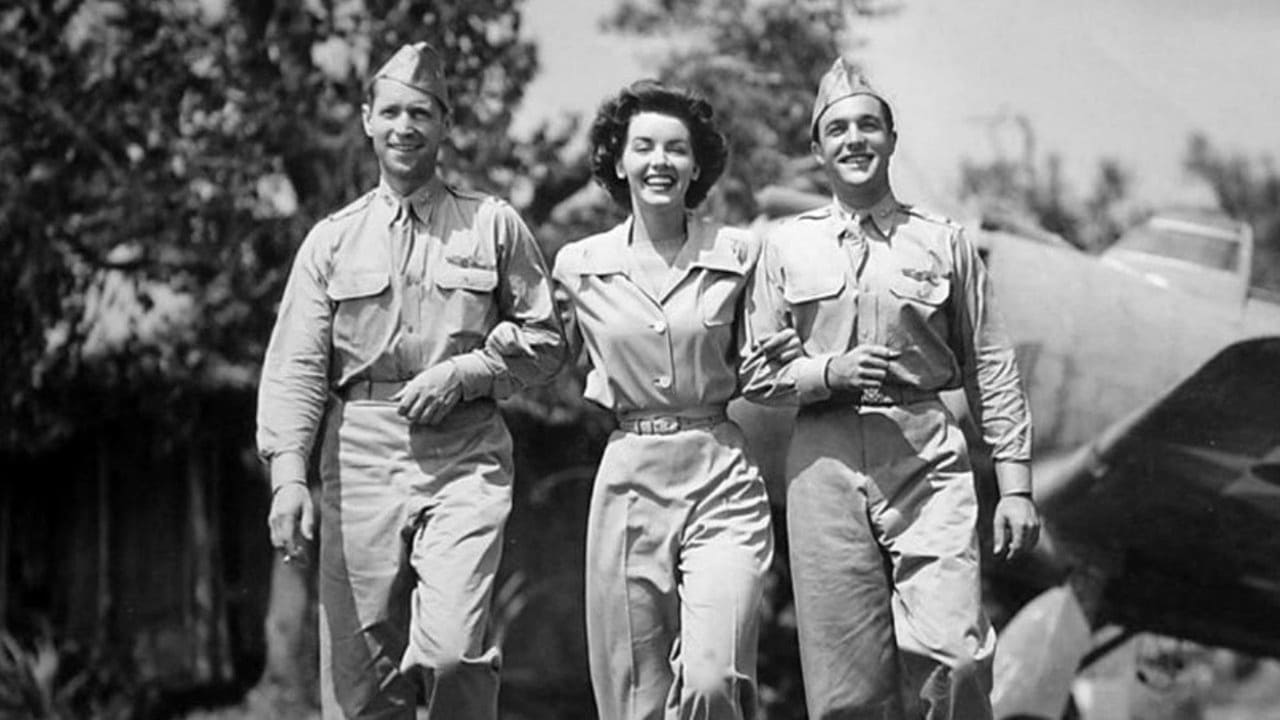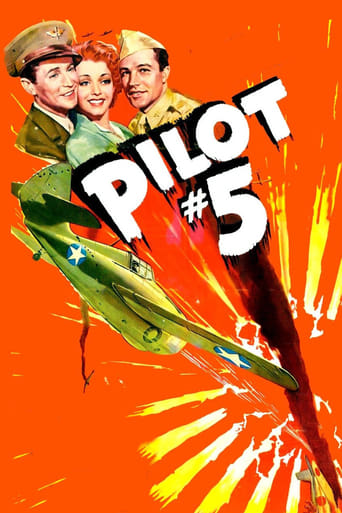

Wonderful character development!
... View MoreSave your money for something good and enjoyable
... View MoreInstead, you get a movie that's enjoyable enough, but leaves you feeling like it could have been much, much more.
... View MoreOne of the film's great tricks is that, for a time, you think it will go down a rabbit hole of unrealistic glorification.
... View MoreFranchot Tone, Van Johnson, and Gene Kelly star in WW II flick about an American unit, stuck with a dutch commander. This was 1943, so we had already been in the war for a couple years. Down to one plane, they must take it out and do whatever damage they can. Lots of flashbacks, as we hear everyone's story, and how they got to be here. That takes up most of the film. VERY typical WW II film. Everyone doing their part. Some fun supporting roles -- Eddie Acuff, Monte Blue, Peter Lawford. Names that would turn into bigger names a few years later. Story by David Hertz. Directed by George Sidney, who co-founded Hanna Barbera. Also directed Kiss me Kate, Bye Bye Birdie, Three Musketeers, Pal Joey, Annie get your Gun,and SO MANY other biggies. I'm surprised that Sidney never won an Oscar.. probably should have gotten a lifetime achievement award or something. This one is okay. Chugs right along, Kind of two different plots though... there's the WW II story, and the "rich versus the poor" story-line within the flashbacks. Not bad. MGM/Loews. Shows now and then on TCM.
... View MoreWhile some aspects of this film seem a tad hokey, overall it's a very good and enjoyable film and I am sure it did a lot to shore up support at home for the war effort.As the film begins, there's a rag-tag group of American, British and Dutch soldiers fighting off the Japanese attack in the Pacific. The new leader of this group asks for a pilot to volunteer for what probably is a suicide mission--there is only one flyable plane left and he's to use it against a major Japanese attack. All the American pilots quickly volunteer but the Captain (Franchot Tone) is chosen because of his bravery and because he has a crazy idea he can rig up a bomb to his Seversky P-35 fighter and attack the nearby Japanese aircraft carrier. Considering that by the time this film was made the P-35 was an obsolete plane, it was indeed a fools errand.After Tone leaves, the five five remaining officers talk about what sort of man Tone was and what may have led to his volunteering for such a mission. So Tone's unusual story is told through a series of rather interesting flashbacks.In the end, Tone attacks the carrier and fights off Japanese planes that in midair mysteriously turn into British Spitfires (due to a poor use of stock footage--a common problem in films of this era). And considering that it's a wartime propaganda film, it's almost a foregone conclusion what happens next--though it is still a very tense and exciting portion of the film.Overall, this is a better than average war film with decent enough action, but more importantly a good story to support it.
... View More**SPOILERS** The movie in a round about way tries to connect political corruption in America with the Fascist dictatorships in Europe and Asia that the US, and it's allies, were at war with in WWII. We see early in the movie "Pilot #5" that the pilot in question had a death wish and was more then willing to give his life for his country. Not at what the enemy Japanese did by attacking the Pacific Fleet at Pearl Harbor but what he did, in working as a henchman, for the corrupt Durban Machine back home in the states.With only one plane left to stop the Japanese from taking over Dutch controlled Java the five pilots available to fly it are interviewed by Dutch Major Eichel, Steven Geray, who end's up giving, what turned out to be a suicide mission, the controls to US pilot George Collins, Franchot Tone. As Collins takes off to confront the Japanese Fleet were shown in a number of flashbacks what lead up to his joining the USAAF and why he's so determined to to stop the spread of Fascism in the world. Collins as a young man tried to join the US military but was turned down because of a severe head injury that he claimed to had suffered in a car crash. The US Army recruiter Whiston Davis, Alan Baxter, having second thoughts about turning down the very eager and later disappointed Collins goes to his home town to find out just why he so desperately want's to join. It turns out that Collins is the most hated man in town for working as a lawyer for the corrupt Durban Machine run by the indited and later convicted former Govenor Durban, Howard Freeman.Right out of law school Collins with the help of his childhood friend Vito Alessandro, Gene Kelly, got a job for Gov. Durban and things couldn't have looked better. At first Collins and his girlfriend Freddie, what a strange name for a girl, Andrews (Marsha Hunt) were on easy street with a bright future ahead of them. Planing to marry Freddie Collins started building their dream home but things got a bit sour when he began to realize what a lowlife his boss Durban was.What really clinched it for Collins was when he, together with a number of Durban strong-arm men, tried to force the Pritchard out of their farm for unpaid taxes, which was pure BS,in order to grab their property. The ensuing showdown caused the Pritchard's mentally ill teenage daughter Hanna, Dorothy Morris, to hysterically climb up into the chimney where she suffocated and then died from fright. Sick at what he did Collins quit working for Durban by belting him in the mouth only to get the hell beat out of him by two of Durban's bodyguards.Later working behind the scenes Collins helped to unseat Durban and put him behind bars but that fact was never made public by the anti-Durban coalition that he worked for. Collins was so despised in the state that no business, political or private, would have him work for them publicly feeling that, by the public knowing that Collins was employed by them, it would only hurt not help .The movie now goes back to real-time with Collins on his way to take on single-handedly the Japanese Navy, and with his bombers instruments malfunctioning, zig-zags through the the murderous Japanese anti-aircraft artillery fire and Jap Zero's in order to draw a bead on the Jananese carrier group. Unable to drop his 500 pound bomb Collins doing a wild and dangerous kamikaze-like maneuver pile-drives right into a Japanese aircraft carrier sending it to the bottom and at the same time killing himself. We get a big speech from Major Eichel at the end of the film, with such a heavy Dutch accent that he sounds almost unintelligible, how he knew that Collins was the right man for the job. It was because he saw that Collins wasn't afraid to die for his beliefs. Were told that the Fascists that Collins put out of actions aren't just the Japanese or German Nazis but one giant enemy that's in every corner of the earth even in our own countries and must be completely and totally destroyed.Really deep and heavy stuff for even a war propaganda film which "Pilot #5" was. It's no wonder that the film was suspected by some very ultra-patriotic US organizations, after the war, to be subversive to the American way of life. Putting the Durban political machine on Par with Hitler and Tojo was just a bit too much to take when the nation was at war. It must have been obvious to people watching the movie back then that we were not only fighting a Fascist enemy overseas but at home, with the likes of Gov. Durban, as well! It was hard to see who was a worse heavy or bad guy in the film and more of a threat to America; an elected but totally corrupt state governor or the enemy German or Japanese Fascists regimes?
... View MoreThere was just one american aircraft left on the small South Pacific island. Five remaining pilots stood in formation as the commander asked for a volunteer to fly out to the threatening Japanese fleet. All five volunteered. The commander had to determine which volunteer to choose. He asked each one in turn why he wanted to fly the mission. Answers like "The dirty Japs killed my brother at...", etc. Then, pilot no. 5 was asked why he was volunteering. His answer was "For my country."These words of dedication to country made a lasting impression on an 11 year-old boy.
... View More